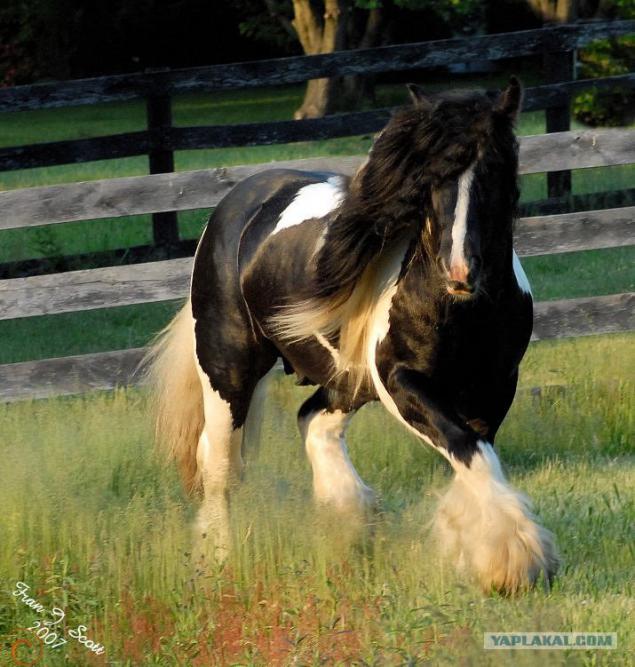689
Gypsy legend from the shores of Albion
Tinker, Koba Irish, Gypsy (Harness) horse - all names for the same wonderful breed has acquired in a flash - in just the last 10 years - an unprecedented popularity around the world. Today, these kind of horses fascinating horsemen on both sides of the Atlantic, although recently their last virtually nothing was known ...
3 photos + text

"Do not buy a gypsy horse, a priest's daughter thou shalt not" - so could not say any Russian peasant times of Mikhail Lermontov and Leo Tolstoy. And that, of course, had its base. In Russia, and in all the other countries, which are scattered nomadic people, the Gypsies never too scrupulous to someone else's property does not include: fraud sinned, and indeed much sympathy from the settled inhabitants did not cause. The Russian language became even such unusual verb as "gypsies", including "Gypsy horses" - that is, sell and resell the horses with a dubious history and not the most remarkable qualities. Once this write contemporaries, and the expression itself remained in people's memory, then this actually took place. But with all that Roma were and are still top-notch riders, who know a lot about good horse and able to handle them. In the circles of horsemen can often hear stories about the amazing abilities of a gypsy who is a word unknown cools stallion, the only touch of calming the frightened mare. Something of this "folklore", of course, inspired by the romantic image of the "last nomads of Europe," created in our minds even Pushkin well, something that has a real basis. Whatever it was, the Gypsies left us absolutely amazing breed whose potential is just beginning to unfold, and that alone makes us respect the freedom-loving people of the Roma.

The history of the Irish kobs, or Roma harness horses, probably began many thousands of kilometers from Ireland. Today, there is not much doubt that the roots of the Roma are in India. When, how and why of the population of this ancient country withdrew from the place and moved to the West - remains unclear. But in the XII-XIII centuries, the Roma firmly entrenched in the Byzantine Empire, then of "vagrants from the East" was first found in Europe. Over the following centuries, the Roma are settled across the continent and the beginning of the XV century make it to the British Isles. However, here they are faced with another vagrant, who are called "Tinker", ie "Plumber", "tinker". If the name of the English travelers is clear - they are like gypsies, mainly engaged in the processing of metals, their origin is shrouded in mystery. Were the natives of Britain, or just the first, unknown to us wave of Roma? Now it is not so important, because the Roma fully occupied niche Tinker, away from them even the name.

Source:
3 photos + text

"Do not buy a gypsy horse, a priest's daughter thou shalt not" - so could not say any Russian peasant times of Mikhail Lermontov and Leo Tolstoy. And that, of course, had its base. In Russia, and in all the other countries, which are scattered nomadic people, the Gypsies never too scrupulous to someone else's property does not include: fraud sinned, and indeed much sympathy from the settled inhabitants did not cause. The Russian language became even such unusual verb as "gypsies", including "Gypsy horses" - that is, sell and resell the horses with a dubious history and not the most remarkable qualities. Once this write contemporaries, and the expression itself remained in people's memory, then this actually took place. But with all that Roma were and are still top-notch riders, who know a lot about good horse and able to handle them. In the circles of horsemen can often hear stories about the amazing abilities of a gypsy who is a word unknown cools stallion, the only touch of calming the frightened mare. Something of this "folklore", of course, inspired by the romantic image of the "last nomads of Europe," created in our minds even Pushkin well, something that has a real basis. Whatever it was, the Gypsies left us absolutely amazing breed whose potential is just beginning to unfold, and that alone makes us respect the freedom-loving people of the Roma.

The history of the Irish kobs, or Roma harness horses, probably began many thousands of kilometers from Ireland. Today, there is not much doubt that the roots of the Roma are in India. When, how and why of the population of this ancient country withdrew from the place and moved to the West - remains unclear. But in the XII-XIII centuries, the Roma firmly entrenched in the Byzantine Empire, then of "vagrants from the East" was first found in Europe. Over the following centuries, the Roma are settled across the continent and the beginning of the XV century make it to the British Isles. However, here they are faced with another vagrant, who are called "Tinker", ie "Plumber", "tinker". If the name of the English travelers is clear - they are like gypsies, mainly engaged in the processing of metals, their origin is shrouded in mystery. Were the natives of Britain, or just the first, unknown to us wave of Roma? Now it is not so important, because the Roma fully occupied niche Tinker, away from them even the name.

Source:






















